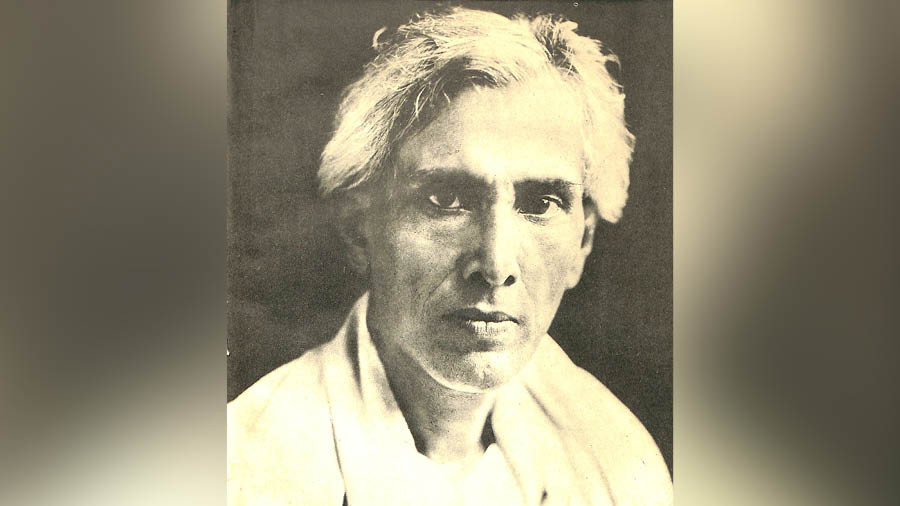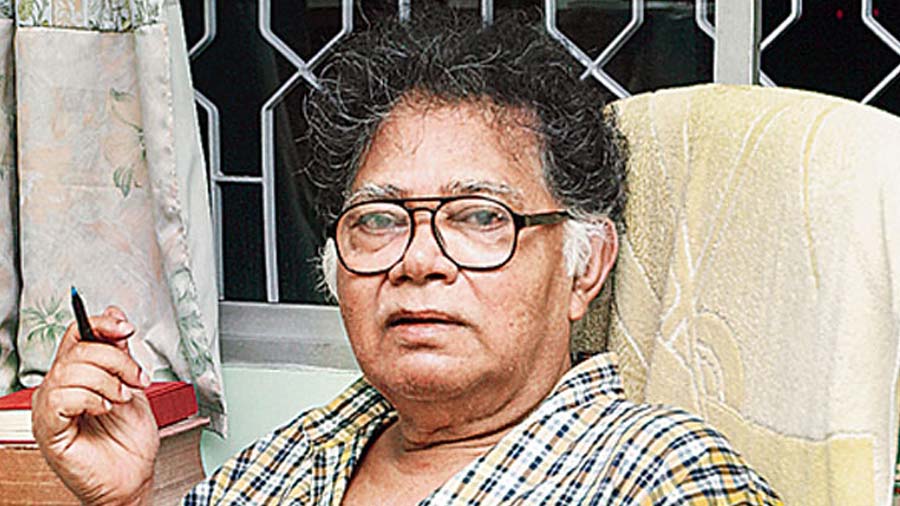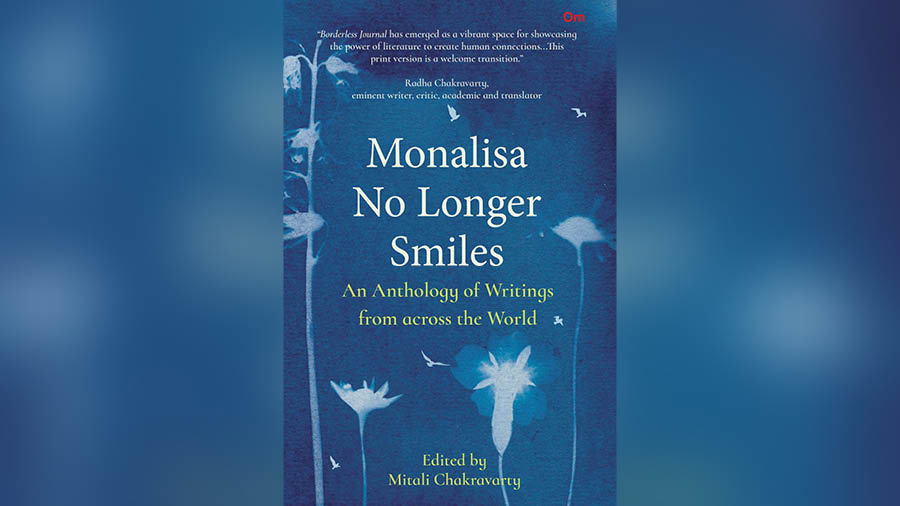Monalisa No Longer Smiles: An Anthology of Writings from Across the World edited by Mitali Chakravarty, the founder-editor of Borderless Journal, makes a timely appearance to “connect beyond the bounds drawn by money, nationality, rituals and cultures” and other man-made divides.
The anthology showcases an eclectic range, excellent creative writings and critical discourses that converge to spread a healthy, egalitarian message of love and forgiveness for fragmented lives torn apart by wars, internal feuds and political hate. Monalisa…. has a definitive intent. It seeks thinking people, gamechangers and influencers to speak and act for a borderless society, and gives the carefully culled writings the ‘right’ space to inhabit and the ‘right’ climate to breathe in. It is divided into a number of sections showcasing a variety of genres.
‘Classics in Translation’ has a power-packed non-fiction by Tagore, The Library, translated by Chaitali Sengupta. It implodes within us with a quiet force: “Just as the Himalayas contain in its frozen ice thousands of floods, in the same way this library preserves the best of human emotion in its breast.” Kazi Nazrul Islam’s Temples and Mosques, translated by Sohana Manzoor, shows religious bigotry eating away people like a canker, breeding fanatics who kill and plunder while Gods are “imprisoned within the temple, the reformatory of the mosque, in the jail of the church”. Likewise, Bijan Najdi, translated from Persian by Davood Jalili, deflects our attention from clashing swords and shooting to “the dolls with bellies full of TNT/ which fell on Vietnam”, with innocent children running towards them. Abhagi’s Heaven by Sarat Chandra Chattopadhyay, translated from Bengali by Aruna Chakravarty, showcases the aspirations of Abhagi, an “untouchable” Duley by caste. Nadir Ali’s fascinating story Bundu, Consoler of the Rich, translated from Punjabi by Amna Ali, dissolves borders of class and gender, interestingly through dreams!

‘Abhagi’s Heaven’ by Sarat Chandra Chattopadhyay, translated from Bengali by Aruna Chakravarty, showcases the aspirations of Abhagi, an “untouchable” Duley by caste
The poetry section includes Lesya Bakun’s “Refugee in my own country/ I am Ukraine” that speaks about the city Shchastia, a name that could be literally translated as “happiness”, a cruel irony. In the poem aptly titled “I Too Have a Dream”, Michael R. Burch shows how, not to be perceived as the “other” is a luxury even for the child who dreams “that one day Jews and Christians/ will see me as I am: /staring down the barrels their big bazookas/ knowing I did nothing/ to deserve their hatred.”
War, pandemic, pestilence, they all keep happening. So how does a person stay sane? With a dash of humour, of course, as does Rhys Hughes who writes in Pandemic Panic: ‘I make a mask from an old shoe/and wear it out./ Is this what I am/required to do?/ I suppose so./The smell is worse/ than the curse/of the virus.’
In Discussion is a conversation between the late Sunil Gangopadhyay and Aruna Chakravarty during the sesquicentennial Tagore celebrations hosted by Sahitya Akademi. Here, Gangopadhyay gives candid opinions on “The Universal Bard: Rabindranath Tagore”.

In ‘Discussion’, Sunil Gangopadhyay gives candid opinions on “The Universal Bard: Rabindranath Tagore” TT archives
The short story section hosts content that shows borders can be grim and threatening. Paresh Tiwari’s Line of No Control touches on this issue with the aid of a sheepdog, an “emissary of peace between two nations”. Equally unsettling is the enemy “within” in the Nigerian Civil War with the senseless brutality we see in Steve Ogah’s The Protest Outside. After more stories in this vein, Santosh Bakaya’s When Bapu Met MLK Jr comes clothed as a friendly banter between Bapu and Martin Luther King Jr, perched on candy floss clouds, up there. After a mutual exchange of admiration for the milestones they achieved, both of them return us to the timeless value of love and forgiveness, because hate is “too heavy a burden to carry”.
In ‘Essays’, Debraj Mookerjee goes beyond simplistic divides of country, class or caste to evolve a philosophy of being “borderless” in his well-argued discourse “When West Meets East and Greatness Blooms”. “One Life, One Love, 300 Children” by Keith Lyons takes us back to the idea that travel educates, expands and teaches, if only we let them do so. Lyons tells us how he met Tendol Gyalzur whose family was killed while fleeing Tibet in 1959, along with 80,000 Tibetans including the 14th Dalai Lama. She returns to China, to work with those occupiers who’d orphaned her. But then, she shows, ‘Love is boundless, and able to turn dry lands into a lush pasture.’ In “Unbowed, She Stayed”, Bhaskar Parichha writes about the renowned Wangari Muta Maathai who won the Nobel Prize for Peace in 2004, and who founded the Green Belt Movement on love that rippled out to nurturing the planet we live in and the environment. Equally thought-provoking essays by Ratnottama Sengupta, Sybil Pretious, Meenakshi Malhotra and Aysha Baqir round up this section of the book.

In ‘Unbowed, She Stayed’, Bhaskar Parichha writes about the renowned Wangari Muta Maathai who won the Nobel Prize for Peace in 2004, and who founded the Green Belt Movement on love that rippled out to nurturing the planet we live in and the environment UN.org
The last section is ‘Conversations’ with the editor. Lesya Bakun, a refugee from Ukraine, tells us “Ukrainians want their identity respected, not annihilated” while on the run from a war devastated country. She tells us her story about facing bombs while carrying food for her mother who had Covid-19, staying in a refugee shelter and finally escaping to Lithuania by crossing the border. That wars are not the only form of disputes, conflicts can also hover over languages adopted by the writer because it is perceived to be alien, is brought out by Arundhathi Subramaniam, who declares stoutly: ‘English is my first language and it is an Indian language.’ In another conversation, “[But] how can we survive without empathy”, Goutam Ghose talks on the need for empathy while discussing his film Moner Manush based on the life of Lalon Fakir. Kathleen Burkinshaw’s comments on her mother, a hibakusha, a survivor of the Hiroshima blast during World War II. Burkinshaw reflects on her resilience… ‘she never lost her ability to love’. Conversations with Aruna Chakravarty, Devaki Jain, Sumana Roy, Teresa Rehman and Ratnottama Sengupta revolve around similar themes.

In another conversation, Goutam Ghose talks on the need for empathy while discussing his film ‘Moner Manush’ based on the life of Lalon Fakir TT archives
Love, and altruism win in the end. Monalisa…. is the kind of book one buys to read, to leave behind for the younger members of the family, to gift to friends, and to share with young students, teachers and influencers who will realise some day that the seemingly utopian ideal of being borderless is something that can be actualised. Mona Lisa may smile again.
---------
Lakshmi Kannan, also known by her Tamil pen-name “Kaaveri”, has published 25 books till date that include poems, novels, short stories and translations
---------
Monalisa No Longer Smiles: An Anthology of Writings from Across the World, edited by Mitali Chakravarty, Om Books International, 2022
